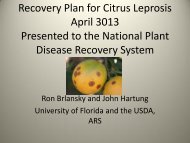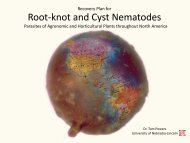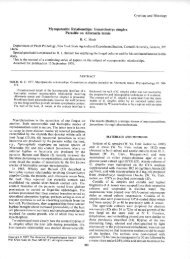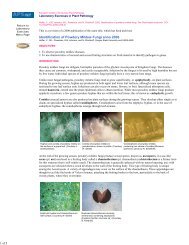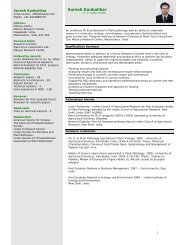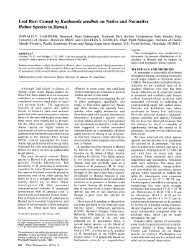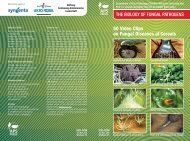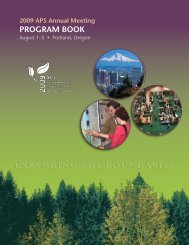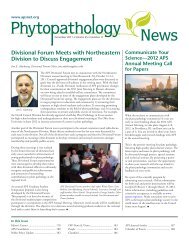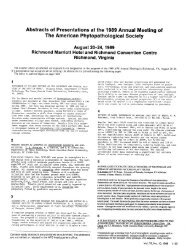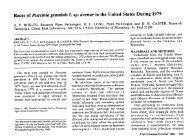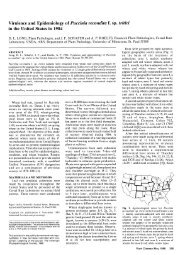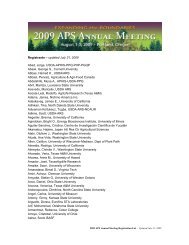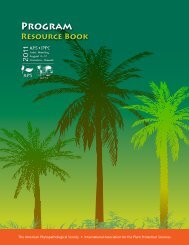See the program book (PDF) - American Phytopathological Society
See the program book (PDF) - American Phytopathological Society
See the program book (PDF) - American Phytopathological Society
You also want an ePaper? Increase the reach of your titles
YUMPU automatically turns print PDFs into web optimized ePapers that Google loves.
WeDneSDAy<br />
SeSSiOnS – Wednesday Morning, Special<br />
Down in <strong>the</strong> Dirt with Phytopathogenic Verticillium:<br />
Genetic and Molecular Tales of a Vascular Fungus<br />
9:00 – 11:30 a.m. * 200 DE<br />
Section: Biology of Pathogens<br />
Organizers: Paola Veronese, North Carolina State University,<br />
Raleigh, NC; Ka<strong>the</strong>rine Dobinson, Agriculture & Agri-Food<br />
Canada, London, Ontario, Canada; Steve Klosterman, USDA<br />
ARS, Salinas, CA<br />
Moderator: Jane Robb, University of Guelph, Guelph, ON,<br />
Canada<br />
Sponsoring Committees: Genetics<br />
Verticillium spp. are globally distributed, broad-host-range<br />
fungal pathogens causing vascular diseases for which new<br />
effective disease control measures need to be developed.<br />
The symposium will start with a historical perspective of<br />
<strong>the</strong> importance of this extremely diverse group of plant<br />
pathogens and <strong>the</strong> work carried out to date. The symposium<br />
will continue with discussions of contemporary work on<br />
<strong>the</strong> molecular genetics of fungal growth, development and<br />
pathogenicity as well as host defense mechanisms. Finally,<br />
<strong>the</strong> symposium will conclude with a discussion of future<br />
directions for Verticillium research that includes presentation<br />
of Verticillium genome sequencing progress and how <strong>the</strong>se<br />
new findings may collectively lead to better understanding and<br />
control of <strong>the</strong>se significant plant pathogens.<br />
9:00 a.m. S-103. Significance and Life History of<br />
Phytopathogenic Species of Verticillium. R. C.<br />
ROWE (1). (1) Ohio State University, Wooster,<br />
OH, U.S.A.<br />
9:30 a.m. S-104. The molecular road from differentiation<br />
of Verticillium isolates to analysis of growth<br />
and development. K. F. DOBINSON (1). (1)<br />
Agriculture & Agri-Food Canada, London, ON,<br />
Canada<br />
10:00 a.m. S-105. Arabidopsis-Verticillium spp. interaction<br />
as a model disease system. P. VERONESE (1). (1)<br />
North Carolina State University, Raleigh, NC,<br />
U.S.A.<br />
10:30 a.m. S-106. Functional analysis of tomato responses<br />
to Verticillium dahliae. B. THOMMA (1), U.<br />
Ellendorff (1), P. van Esse (1), R. de Jonge (1), G.<br />
van den Berg (1), K. Yadeta (1), S. Rehman (1),<br />
and E. Fradin (1). (1) Wageningen University,<br />
Wageningen, The Ne<strong>the</strong>rlands<br />
11:00 a.m. S-107. Verticillium comparative genomics:<br />
understanding pathogenicity and diversisty.<br />
S. KLOSTERMAN (1), P. Veronese (2), K. F.<br />
Dobinson (3), K. Subbarao (4), D. I. Heiman<br />
(5), S. Young (5), C. D. Kodira (5), L. Alvarado<br />
(5), J. Galagan (5), B. Birren (5), C. Cuomo (5),<br />
A. Anchieta (1), S. Kang (6), S. E. Gold (7), and<br />
L.-J. Ma (5). (1) USDA-ARS, U.S.A., (2) North<br />
Carolina State University, U.S.A. (3) Agriculture<br />
and Agri-Food Canada, Canada (4) University of<br />
California Davis, U.S.A. (5) Broad Institute of<br />
MIT and Harvard, U.S.A. (6) Penn State University,<br />
U.S.A. (7) University of Georgia, U.S.A.<br />
60<br />
From Field to Fork: Historical Perspectives and Future<br />
Promise of Postharvest Decay Management<br />
9:00 – 11:30 a.m. * 208 AB<br />
Section: Plant Disease Management<br />
Organizers: Jim Adaskaveg, University of California,<br />
Riverside, CA; Eric Tedford, Syngenta Crop Protection,<br />
Greensboro, NC; Gerald J. Holmes, North Carolina State<br />
Univ, Raleigh, NC<br />
Moderators: Jim Adaskaveg, University of California,<br />
Riverside, CA; Eric Tedford, Syngenta Crop Protection,<br />
Greensboro, NC<br />
Sponsoring Committees: Postharvest Pathology, and<br />
Industry<br />
A historical review and an outlook into <strong>the</strong> future of integrated<br />
postharvest decay management, including sanitation,<br />
biocontrol, fungicide, and modified-environment treatments.<br />
9:00 a.m. S-108. History of postharvest decay management.<br />
J. A. BARTZ (1). (1) University of Florida,<br />
Gainesville, FL U.S.A.<br />
9:30 a.m. S-109. Consumer demands and fruit quality. C.<br />
TONG (1). (1) University of Minnesota, St. Paul,<br />
MN , U.S.A.<br />
10:00 a.m. S-110. Sanitation and food safety over <strong>the</strong> years.<br />
T. V. SUSLOW (1). (1) University of California,<br />
Davis, CA, U.S.A.<br />
10:30 a.m. S-111. New fungicides and resistant management<br />
strategies. J. ADASKAVEG (1). (1) University of<br />
California, Riverside, CA, U.S.A.<br />
11:00 a.m. S-112. Biological control. W. JANISIEWICZ (1).<br />
(1) USDA ARS AFRS, Kearneysville, WV, U.S.A.<br />
Plant Virology: Impact on Science and <strong>Society</strong><br />
9:00 – 11:30 a.m. * 208 CD<br />
Section: Molecular/Cellular Plant Microbe Interactions<br />
Organizer/Moderator: Alexander Karasev, University of<br />
Idaho, Moscow, ID<br />
Sponsoring Committees: Virology<br />
Plant virology had a profound effect on <strong>the</strong> development of life<br />
science disciplines in <strong>the</strong> past 100 years. From virus purification<br />
to crystallization, to identification of <strong>the</strong> genetic material,<br />
to development of methods of detection, to elucidation of<br />
mechanisms of interaction with <strong>the</strong> host. It is important to<br />
understand that virology as an integral part of plant pathology<br />
made a seminal contribution to <strong>the</strong> development of modern<br />
human society. Myron Brakke was a visionary scientist who<br />
advanced plant virology, and molecular biology as a whole. He<br />
introduced a concept of gradient fractionation and successfully<br />
used it to discover divided genomes in plant viruses. He was<br />
a member of <strong>the</strong> National Academy. This symposium will be<br />
devoted to Myron Brakke and focused on impact <strong>the</strong> plant<br />
virology had on science and society in <strong>the</strong> 20th century, and by<br />
extension on its modern role.



